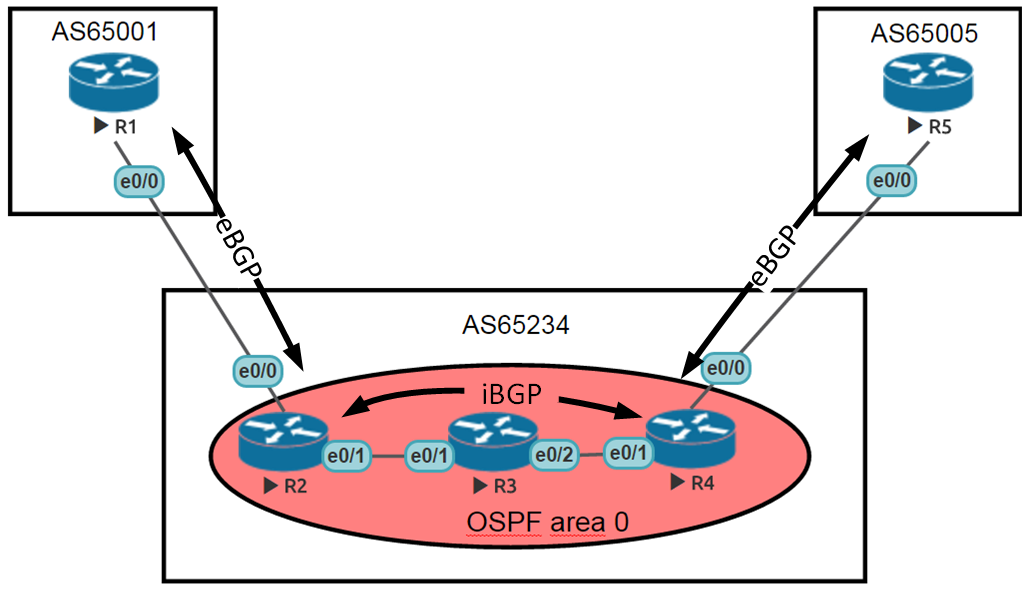BGP Synchronisation and internal redistribution
Summary
BGP synchronisation forces the bgp process to accept a prefix received from a ibgp peer only if an igp already installed a route for the same prefix in the routing table.
Basic Topology

Issue
Let see what happens in the routing table of R4 regarding the route to reach the Loopback of R1 (1.1.1.1)
Without redistribution of BGP inside IGP
With synchronisation off(default)
Without synchronisation we can see the prefix 1.1.1.1 is accepted by the bgp process of R4 and market as best
R4#sh ip bgp 1.1.1.1
BGP routing table entry for 1.1.1.1/32, version 2
Paths: (1 available, best #1, table default)
Advertised to update-groups:
8
Refresh Epoch 1
65001
2.2.2.2 (metric 21) from 2.2.2.2 (2.2.2.2)
Origin IGP, metric 0, localpref 100, valid, internal, best
rx pathid: 0, tx pathid: 0x0And we can see the prefix is also installed in the routing table of R4 and forwarded to R5
R4#sh ip route 1.1.1.1
Routing entry for 1.1.1.1/32
Known via "bgp 65234", distance 200, metric 0
Tag 65001, type internal
Last update from 2.2.2.2 00:00:12 ago
Routing Descriptor Blocks:
* 2.2.2.2, from 2.2.2.2, 00:00:12 ago
Route metric is 0, traffic share count is 1
AS Hops 1
Route tag 65001
MPLS label: none
R5#sh ip route 1.1.1.1
Routing entry for 1.1.1.1/32
Known via "bgp 65005", distance 20, metric 0
Tag 65234, type external
Last update from 192.168.45.4 00:12:19 ago
Routing Descriptor Blocks:
* 192.168.45.4, from 192.168.45.4, 00:12:19 ago
Route metric is 0, traffic share count is 1
AS Hops 2
Route tag 65234
MPLS label: noneBut we have a big reachability issue. R3, in the core of the OSPF area doesn't know how to route this packets, blackholing all the packet.
R3#sh ip route 1.1.1.1
% Network not in tableWith synchronisation on
R4#conf t
Enter configuration commands, one per line. End with CNTL/Z.
R4(config)#router bgp 65234
R4(config-router)# synchronization
R4(config-router)# ex
R4# clear ip bgp *When we activate bgp synchronisation, the prefix 1.1.1.1 is refused by the bgp process of R4, marked as not synchronized, not injected to the routing table and not forwarded to R5.
R4#sh ip bgp 1.1.1.1
BGP routing table entry for 1.1.1.1/32, version 0
Paths: (1 available, no best path)
Flag: 0x820
Not advertised to any peer
Refresh Epoch 1
65001
2.2.2.2 (metric 21) from 2.2.2.2 (2.2.2.2)
Origin IGP, metric 0, localpref 100, valid, internal, **not synchronized**
rx pathid: 0, tx pathid: 0
R4#sh ip route 1.1.1.1
% Network not in table
R5#sh ip route 1.1.1.1
% Network not in tableReinjecting the BGP routes inside the IGP.
If we reinject the route to 1.1.1.1 inside de OSPF area 0, R4 learns the route to reach it.
R4#sh ip route 1.1.1.1
Routing entry for 1.1.1.1/32
Known via "ospf 1", distance 110, metric 1
Tag 65001, type extern 2, forward metric 30
Last update from 192.168.34.3 on Ethernet0/1, 00:10:18 ago
Routing Descriptor Blocks:
* 192.168.34.3, from 2.2.2.2, 00:10:18 ago, via Ethernet0/1
Route metric is 1, traffic share count is 1
Route tag 65001And we can see that the prefix is now accepted by the BGP process and marked as synchronized, best
R4#sh ip bgp 1.1.1.1
BGP routing table entry for 1.1.1.1/32, version 2
Paths: (1 available, best #1, table default, RIB-failure(17))
Advertised to update-groups:
10
Refresh Epoch 1
65001
2.2.2.2 (metric 21) from 2.2.2.2 (2.2.2.2)
Origin IGP, metric 0, localpref 100, valid, internal, synchronized, best
rx pathid: 0, tx pathid: 0x0And announced to R5
R5#sh ip route 1.1.1.1
Routing entry for 1.1.1.1/32
Known via "bgp 65005", distance 20, metric 0
Tag 65234, type external
Last update from 192.168.45.4 00:20:41 ago
Routing Descriptor Blocks:
* 192.168.45.4, from 192.168.45.4, 00:20:41 ago
Route metric is 0, traffic share count is 1
AS Hops 2
Route tag 65234
MPLS label: noneConclusion
bgp synchronisation is a method to limit the injection of incorrectly routed traffic to external peer.
In real network, its not used because synchronizing the ebgp and igp routes is not applicable in most scenario.